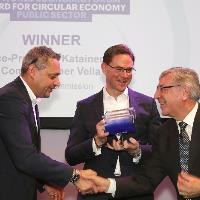(DAVOS) – The EU Commission received the 2019 Circular Economy prize at the World Economic Forum Monday, in recognition of its work to accelerate the EU’s transition towards a circular economy.
The circular economy is the EU executive’s flagship environment strategy, the aim of which is to protect the environment and reduce greenhouse gas emissions while delivering opportunities for jobs, growth and investment.
Commission vice-president Jyrki Katainen and Commissioner Karmenu Vella received The Circulars prize, offered in the ‘Public Sector’ category, on behalf of the Commission.
“This prize is an acknowledgement of the work done in the past years and of the fact that the circular economy can indeed boost businesses’ competitiveness, open up new markets for green products and services and create jobs in Europe,” said Mr Katainen.
Commissioner Vella added: “We started with a very ambitious and comprehensive plan how to change our economy. This award recognises that our choice of ‘redesign, reuse, recycle’ is the right one for the environment and the industry alike. Such recognition puts even more responsibility on us to continue in the spirit of circularity.”
The Circular Economy Package, established by the Commission in 2015, aims to close the resource loop by introducing measures covering the whole lifecycle of products and materials from production and consumption to management of waste and its re-use as secondary raw materials in the economy.
The suggested measures also tackle climate change with energy savings and reduced greenhouse gas emissions, and include the first-ever European Strategy for Plastics.
Circular Economy Action Plan include:
- Legislative proposals on waste, adopted by the Parliament and the Council in May 2018 and into force since July 2018;
- A revised Fertilisers Regulation focusing in particular on waste-based and organic fertilising products, currently being finalised;
- The first ever European Strategy for Plastics in the Circular Economy, including a legislative proposal on single-use plastic items and a Circular Plastics Alliance;
- A Monitoring Framework for the Circular Economy;
- A European Circular Economy Stakeholder Platform;
- The Ecodesign Work Plan 2016-2019;
- Guidance documents in the areas of among others industrial emissions, water management, recycling of construction & demolition waste, unfair commercial practices and Green Public Procurements.
The Commission has delivered more than 90% of the 54 planned actions. A circular economy is part of the modernisation and transformation needed for the EU to become the world’s first major economy to go climate neutral by 2050, as per the long-term strategy put forward by the Commission in November 2018.
The Commission is now reflecting on which steps are now needed to improve sustainability in Europe.



